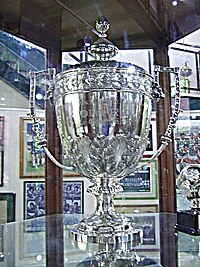 The trophy awarded to champions | |
| Organising body | |
|---|---|
| Founded | 1951 |
| Abolished | 1952 |
| Region | Rio de Janeiro, Brazil |
| Number of teams | 8 |
| Related competitions | Torneio Rivadavia Correa |
| Last champions | |
| Most successful club(s) | (1 title each) |
The Copa Rio (English: Rio Cup) was an international club football tournament with teams from Europe and South America, having been held on two occasions, in 1951 and 1952, in Brazil. Both editions were organised and endorsed by the Brazilian Sports Confederation (Confederação Brasileira de Desportos), the then Brazilian FA and sports main body. The tournament is often regarded in Brazil as an official tournament, at least as far as the Brazilian clubs are concerned (since 1955, FIFA Statutes do not regard international club competitions endorsed uniquely by national football associations as being official).[1][2][note 1][note 2][note 3] The name Copa Rio, Portuguese for Rio Cup, was a homage to Rio de Janeiro City. The 1951 edition of the competition was also hailed as "Club World Cup" or "World Champions Cup" by the Brazilian FA and press. Though some previous club competitions (Football World Championship, Sir Thomas Lipton Trophy, Coupe des Nations) may have been hailed as "the club world contest", Copa Rio was the first attempt at creating a Club World Cup with intercontinental reach.
Two editions of the Copa Rio were held, in 1951 and 1952. Brazilian club Palmeiras won the 1951 tournament, and Fluminense, also from Brazil and co-organizer of the 1952 edition, won the competition in 1952 (CBD, the Brazilian FA, entitled Fluminense to organise the 1952 tournament as part of its 50th anniversary celebrations- the second edition of the tournament was originally scheduled to 1953, but was advanced to 1952 for the aforementioned anniversary celebrations). In 1951 and 1952, Copa Rio suffered the concurrence of the Latin Cup, as some European clubs declined to participate in the former in order to participate in the latter; in 1952, Copa Rio suffered the concurrence of the 1952 Small Club World Cup, as Millonarios and Real Madrid declined to participate in the former in order to participate in the latter. The 1951-1952 Copa Rio was succeeded by another intercontinental club cup organised by the Brazilian FA, the 1953 Torneio Octogonal Rivadavia Correa Meyer, which was then often referred to also as Copa Rio by the European press, which was won by Vasco da Gama from Brazil. In 1953, the Uruguayan FA launched their own intercontinental club cup, based on Copa Rio, and named Copa Montevideo, having been played in Uruguay in 1953 and 1954, won respectively by Nacional and Peñarol. The last attempt of the Brazilian FA to create an intercontinental club cup occurred in 1955, with the Charles Miller Trophy won by Corinthians,the same year the European Cup emerged and became the main international priority of the European football clubs. In 1960, the International Soccer League rose in the USA as another attempt at creating a "Club World Cup" along the lines of Copa Rio, but, as a "world-champions honour", it was overshadowed in importance by the Intercontinental Cup.
- ^ "FIFA Statute" (PDF). p. 5. Archived from the original (PDF) on 30 May 2015.
- ^ "FIFA ignora Taça Latina do Benfica, FC Porto é o clube português com mais títulos". publico.pt (in Portuguese). Archived from the original on 16 June 2015.
- ^ Union des Associations Européennes de Football (October 2004). "50 years of the European Cup" (PDF). pp. 7–9.
- ^ "FIFA Statutes, April 2016 edition" (PDF). p. 5.
- ^ "2018/19 UEFA Champions League regulations" (PDF). p. 10.
- ^ "LAWS OF THE GAME 2015/16" (PDF). p. 18.
- ^ "REGULATIONS on the Status and Transfer of Players 2016" (PDF). pp. 5, 6. Archived from the original (PDF) on 9 September 2016.
- ^ Fédération Internationale de Football Association (ed.). "FIFA Governance Regulations (FGR) 2016" (PDF). pp. 6–7, 9–11.
- ^ "Regulations Governing International Matches" (PDF). pp. 15, 25.
- ^ "FIFA Statutes, April 2016 edition" (PDF). pp. 5, 19–21, 33–35, 37, 44, 74.
- ^ "FIFA ignora Taça Latina do Benfica, FC Porto é o clube português com mais títulos" (in Portuguese). 25 May 2011. Archived from the original on 16 June 2015. Retrieved 18 June 2019.
Cite error: There are <ref group=note> tags on this page, but the references will not show without a {{reflist|group=note}} template (see the help page).